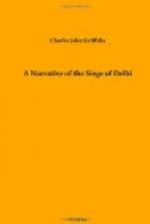No. 1, under Brigadier General Nicholson, consisting of the 75th Regiment, 1st Bengal Fusiliers, and Punjab Infantry, to storm the breach at the Kashmir bastion—in all 1,000 men.
No. 2 Column, under Brigadier W. Jones (H.M. 61st Regiment), consisting of H.M. 8th (the King’s) Regiment, 2nd Europeans, 4th Sikhs—altogether 850 men to storm the breach near the Water bastion.
No. 3, under Colonel Campbell, consisting of the 52nd Regiment, the Kumaon battalion of Goorkhas, and 1st Punjab Infantry—in all 950 men—to assault the Kashmir Gate after it should be blown in by the Engineers.
No. 5, or the Reserve, under Brigadier Longfield (H.M. 8th Regiment), to follow No. 3 by that gate into the city, was composed of the 61st, the Belooch battalion, 4th Punjab Infantry, and the Jhind troops—altogether 1,300 men, with 200 of H.M. 60th Rifles—to cover the advance of Nicholson’s column and to form a reserve.
The whole of the above-named columns were under the immediate command of General Nicholson, on whom devolved all arrangements for carrying out the assault on Delhi.
No. 4 Column, under Major Reid, the officer in command at Hindoo Rao’s house, was formed of part of the 60th Rifles, the Sirmoor battalion of Goorkhas, detachments from European regiments, and the Kashmir contingent. This column was to attack the fortified suburb of Kishenganj, and enter the city by the Lahore Gate, meeting Nos. 1 and 2 Columns at that place.
The cavalry brigade, under Colonel Grant, composed of the 9th Lancers, part of the 6th Carabineers, with Sikh and Punjab cavalry and some Horse Artillery, took up their position on the right of No. 1 Advanced Battery, facing the Mori Gate, and within range of Kishenganj. Their object was to oppose any attempt to take the storming columns in flank, to watch the movements of the enemy, and to guard the camp from surprise.
To the convalescents and a small force of cavalry and artillery the protection of the camp was confided—a very insufficient guard when it is considered that the enemy might well, out of their vast numbers, have detached part of their horsemen and infantry to harass, if not imperil, its safety, and that of the many, sick and wounded. As will hereafter be seen, great danger resulted from the arrangements made in this respect; and had the enemy, after our unsuccessful attack on Kishenganj on the 14th, but shown a spirit of pluck and daring, it is not too much to affirm that the camp might have fallen into their hands, and our successes in the city have thereby been rendered almost nugatory.
The night of the 13th was passed by us in a cheerful mood, everyone hopeful and confident of what the morrow would bring forth. There was a character of determination among the officers and men, a cool, deliberate conviction that, under Providence, success would crown our arms, and that vengeance would be done on those who had forfeited their lives by the cruel massacre of our defenceless women and children.




